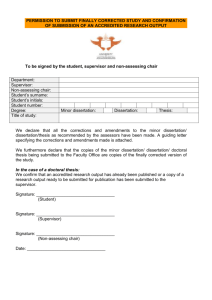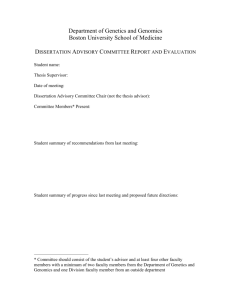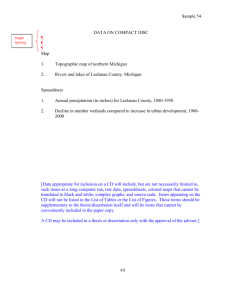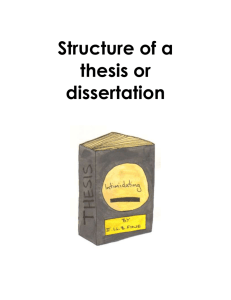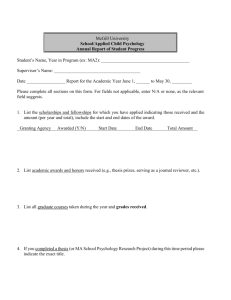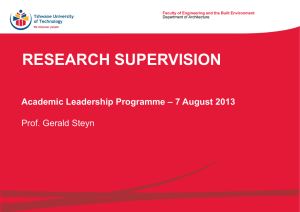Research Supervision Agreement
advertisement
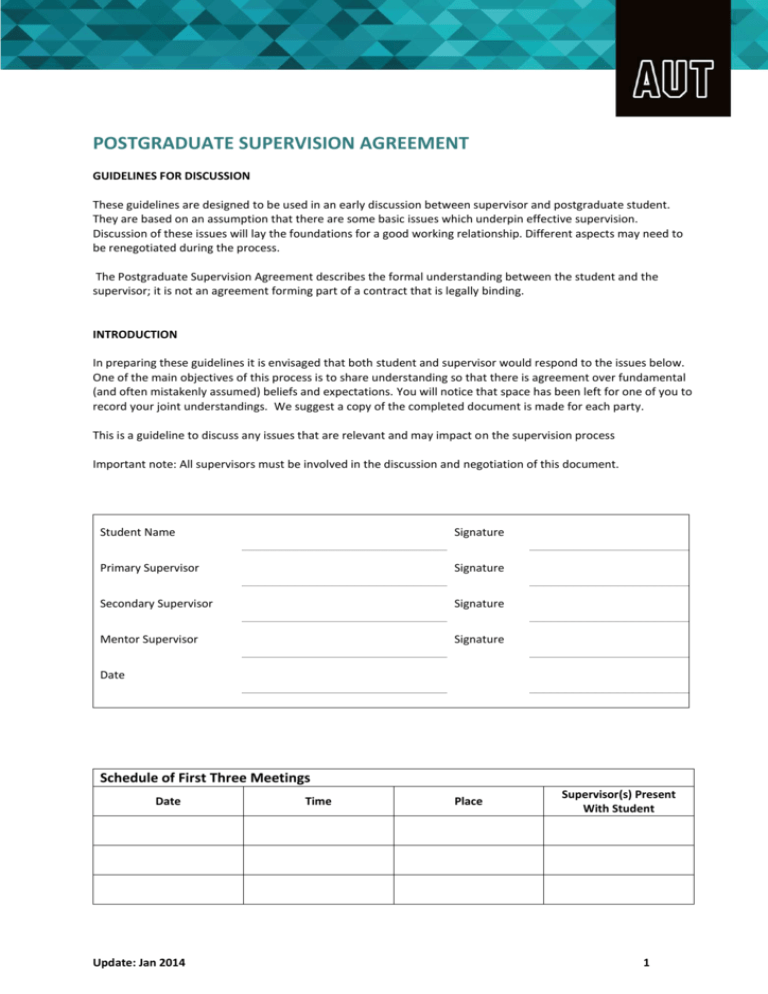
POSTGRADUATE SUPERVISION AGREEMENT GUIDELINES FOR DISCUSSION These guidelines are designed to be used in an early discussion between supervisor and postgraduate student. They are based on an assumption that there are some basic issues which underpin effective supervision. Discussion of these issues will lay the foundations for a good working relationship. Different aspects may need to be renegotiated during the process. The Postgraduate Supervision Agreement describes the formal understanding between the student and the supervisor; it is not an agreement forming part of a contract that is legally binding. INTRODUCTION In preparing these guidelines it is envisaged that both student and supervisor would respond to the issues below. One of the main objectives of this process is to share understanding so that there is agreement over fundamental (and often mistakenly assumed) beliefs and expectations. You will notice that space has been left for one of you to record your joint understandings. We suggest a copy of the completed document is made for each party. This is a guideline to discuss any issues that are relevant and may impact on the supervision process Important note: All supervisors must be involved in the discussion and negotiation of this document. Student Name Signature Primary Supervisor Signature Secondary Supervisor Signature Mentor Supervisor Signature Date Schedule of First Three Meetings Date Update: Jan 2014 Time Place Supervisor(s) Present With Student 1 2 1. SUPERVISOR/STUDENT UNDERSTANDINGS 1.1. Why are you doing this research? 1.2. What is a Thesis/Dissertation? Issues to discuss might include: What is the difference between “thesis” and “dissertation”? What form should a thesis or dissertation proposal have in this discipline? What is the appropriate structure of the written part of a thesis or dissertation for this topic? What paradigm/model of research will be used? What is the appropriate length/word count? What referencing conventions should I follow? Some titles of good thesis or dissertation examples in this field. What is meant by “originality” or “advanced knowledge” or “new knowledge” or “new theory”? Who owns papers arising during and after thesis or dissertation supervision? In what publications could parts of the thesis or dissertation be published as papers? What conferences could be attended to present parts of the thesis or dissertation or the completed thesis or dissertation? What is a Thesis/Dissertation? 1.3. Meetings and Communication Strategies Issues to discuss might include: Expectations of meetings Frequency, duration and location of meetings Any other commitments each party has and any anticipated absences. Access to and availability of the supervisor outside scheduled meeting times Who has responsibility to initiate meetings (if not scheduled regularly)? Protocol for when one person can’t make a scheduled meeting Should meeting decisions be noted? By whom? Meetings: 3 2. EXPECTATIONS OF THE SUPERVISION PROCESS 2.1. Advice and Support Issues to discuss might include: Development of the research proposals (initial proposal, ethics proposal): how much input from supervisor, how will this proceed? Expectations of feedback: how much, how often, in what form, with how much notice? Support with theoretical content, eg. resources, contacts: how much can be expected, given the supervisor’s knowledge of the area? What other kinds of knowledge are needed, e.g. of the research process, of academic writing, of the literature, of data storage and retrieval, of statistical treatment etc.? What resources does the supervisor know of; how much help can she/he give? Are there sources of funding for this research? If so, how can they be accessed? Are there relevant personal circumstances that might make the supervision or completion of the Thesis/Dissertation difficult? E.g. Student suffering financial hardship or experiencing relationship difficulties or supervisor going on sabbatical, expecting a baby or ...? Advice and Support: 2.2. Time Management Issues to discuss might include: What are the different stages in the research process and how long should each one take to complete? What would be a realistic completion date in view of our separate commitments and AUT policy? Time frame and deadlines Time Frame: 2.3. Supervision process Issues to discuss might include: What roles will be taken by each supervisor (primary, secondary and/or mentor), what inputs will each have and what kind of feedback will each have? How often are meetings with both supervisors required? Every meeting? Sometimes? How will each party be kept informed with decisions and updates? If there is disagreement about methods, content etc., between joint supervisors, how is this to be resolved? Any other issues relating to supervisor/student understanding? 4 Co-Supervisors (for thesis students) Any other issues relating to supervisor/student understanding? 3. FACULTY EXPECTATIONS & RESOURCES 3.1. Expectations Issues to discuss might include: What expectations does the faculty have of the student in regards to: Seminar presentation of thesis or dissertation in progress? Small group meetings to discuss progress? Anything else? Expectations: 3.2. Resources Issues to discuss might include: What documents are relevant for postgraduate students? What web URLs are useful? What access does the student have to: A study place, pigeon-hole, locker, laboratory space, etc? Tea/coffee facilities? Paid work, e.g. tutoring? Computer, data storage, e-mail, internet access, interloans? Funding/research grants/scholarships? If available, what are the application processes and deadlines? Who can be contacted for more information? Support services, e.g. technical, secretarial, library? What reimbursement of cost process is available? 5 Resources: 3.3. Monitoring supervision, resolving conflict Issues to discuss might include: How will we monitor that supervision is working well? What are the faculty procedures for: Monitoring the supervision in the event that one party is not happy with its progress or if problems can’t be resolved? For the replacement of a supervisor? For establishing a time commitment by the student (e.g. hours per week, weeks per year, etc.) Other faculty issues? Monitoring supervision, resolving conflict: 4. AUT REQUIREMENTS 4.1. AUT guidelines/regulations Issues to discuss might include: What documents are available on postgraduate supervision? What web URLs are useful? AUT guidelines/regulations: 4.2. Clarification of thesis/dissertation assessment Issues to discuss might include: How is the assessment of the thesis/dissertation or dissertation conducted? Who will be the external assessor? When is this decided? Can I have a say? 6 What is the difference between a thesis and dissertation that passes and one that is awarded with honours? How does the thesis/dissertation grade contribute to the overall pass/honours for the qualification? Clarification of thesis/dissertation assessment: 4.3. Extensions and deferment Issues to discuss might include: What are the protocols for extensions and deferment? In the event that I need an extension over the summer, or beyond, what will the position be regarding supervision? Will there be an extra cost? Extensions and deferment: 4.4. AUT Protocols Issues to discuss might include: What AUT-wide channels are available in the event that one of us is not happy with the progress of the supervision and the faculty cannot or is inappropriate to resolve this? AUT Protocols: 4.5. Ethics Issues to discuss might include: What ethical issues need to be considered in the research project? Do I need to apply for consent from the AUT ethics committee? How do I apply for ethical approval? Deadlines? 7 Ethics: 4.6. Intellectual Property Issues to discuss might include: Who owns the intellectual property that I produce? AUT’s background intellectual property remains AUT’s Who will be the beneficiary(ies) of the income that is generated if the research is commercialised? How will the proportions be decided? Are there any documents outlining my rights and responsibilities with respect to the University and any third parties? What publications might be planned? How will authorship be managed? Seek permission before use of AUT brand Have a mediation process in place if any conflict arises This discussion should be mediated by AUT Enterprise Ltd, AUT’s commercialisation office. Intellectual Property: 4.7. Conflict of Interest Please refer to the current version of the Postgraduate Handbook for information on conflict of interest. This section establishes a set of questions to help identify any potential conflicts. If a conflict is identified, the supervisory agreement should outline how this will be managed. Conflicts of interest? 5. ANYTHING ELSE? Any other AUT-wide issues? Anything else not already covered? 8 9
